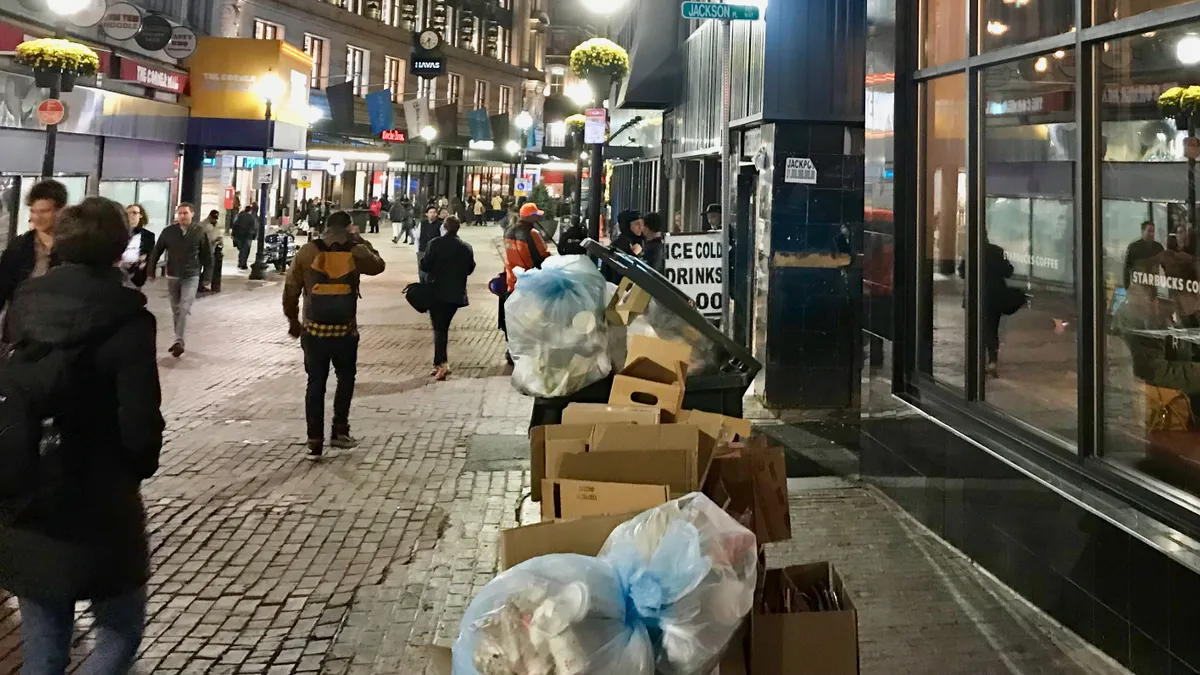Dive Brief:
- Boston's first "zero waste" plan has been released, setting an 80% recycling rate target by 2035 and 90% by 2050. The current citywide recycling rate is 25%. The estimated price tag for all 30 recommendations is $58 million per year, but the city expects it could save $40 million through waste reduction.
- The city will issue an RFP for a subscription-based curbside food waste collection pilot that could launch as soon as this fall. Boston's Public Works Department (PWD) also plans to expand the availability of curbside and drop-off service for yard waste. In addition, an RFI will be issued for a "potential large-scale program" to address both categories.
- Boston will also release an RFP for free curbside textile collection. The plan's recommendations outline multiple other areas of short-term focus: recycling education, commercial waste services, city procurement practices, reporting metrics, infrastructure development and reuse strategies, among others.
Dive Insight:
The long-awaited release of this plan marks the culmination of a multi-year process launched by Mayor Marty Walsh's administration. The effort has included a set of state-funded meetings in 2016, a consulting RFP in 2017 and four Zero Waste Advisory Committee meetings spanning from February to December of last year. Participants included multiple city agencies, as well as the Zero Waste Boston coalition and consultants Perlmutter Associates, Zero Waste Associates and the Center for EcoTechnology.
Current estimates put total waste generation from residential and commercial sources at 1.156 million tons per year — with about 282,000 tons diverted for recycling or composting. The city estimates that at least 75% of the remaining material going to disposal is "potentially recyclable or compostable."
Because approximately 78% of Boston's overall waste stream is from the commercial sector — including construction and demolition activity — this will be a key area of focus if the city wants to see tangible results. While an early concept for waste franchise zones was scrapped, the PWD still has some room to expand permitting standards for commercial operators. This could potentially include new requirements around commercial organics collection that go beyond the Massachusetts Department of Environmental Protection's (DEP) disposal ban threshold.
While potential expansion of residential organics collection would also help make a significant dent in the city's goals, it may come with higher upfront costs. Limited capacity exists in Boston's immediate vicinity to handle all residential material, and environmental groups remain opposed to the co-digestion method being utilized by neighboring Cambridge via a Waste Management pre-processing facility. In a new addition to the plan language, Boston aims to, "when feasible, prioritize processing of compostable materials separately from sewage sludge."
Another key area for improvement on the residential side, as noted in alteration to the draft language, is recycling education. Boston is now emphasizing DEP's quality education offerings in a new "Recycle Right" campaign. While not explicitly stated, this appears to be inspired at least in part by an expected price hike for the city's next recyclables processing contract.
Disagreement over acceptable inbound contamination levels has been a key factor in protracted negotiations between Boston and incumbent contractor Casella Waste Systems. Since Casella submitted the only bid for this contract back in February, company executives have been vocal during earnings calls and event appearances about the need for Boston to clean up its stream.
Final contracts are due to be approved for both residential recycling and disposal by the end of the month, with notable price increases guaranteed in both categories. While many of the items laid out in this new "zero waste" plan may appear expensive at first glance, the fact that business as usual isn't getting any cheaper may incentivize city officials to pursue new alternatives.













